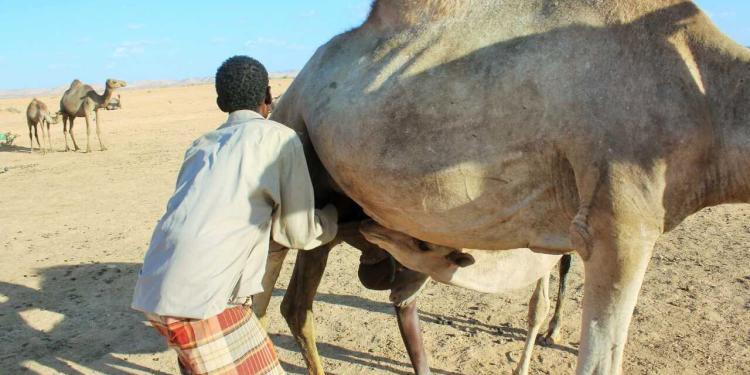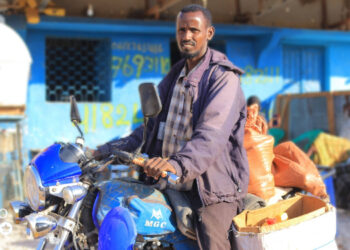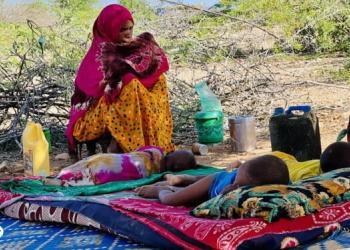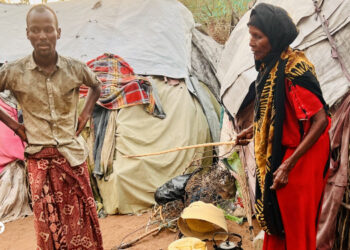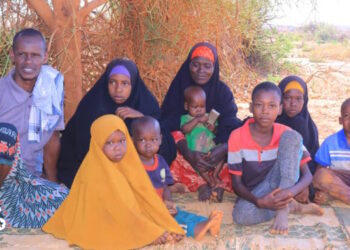(ERGO) – Pastoralists in central Somalia’s Mudug region, who were on the brink of giving up on livestock due to devastating drought, have regained hope since joining a milk trading cooperative that keeps camels on urban-based ranches.
One struggling herder, 50-year-old Saleyman Yasin Nur, saw 170 goats and 41 camels die from lack of pasture and water in the past two years.
Today, he owns only 30 goats and eight camels, a far cry from the wealth he once commanded, reducing him to dependency on relatives for support. He also has debts of $700 for essentials he bought on credit to feed his family.
Recently, however, he watched some neighbours benefitting from leasing out their camels to Barqo-maal milking ranch and decided to do the same.
Now he is making a steady monthly income of $150 by leasing five of his lactating camels to Barqo-maal near Harfo. Around 30 herding families in the area have done the same and are now managing to meet their household needs after prolonged hardship.
“Life today is far better than it was before. Now we eat three meals a day, and I have a monthly income I can rely on. Before, we were in hardship and constantly worried about what to eat. God opened this new path for us and we are living well again,” Saleyman told Radio Ergo.
His five camels are producing more milk under the improved care on the ranch. He no longer needs to trek the 15 kilometres into Harfo town from the rural area to sell milk.
“Before, I had to walk long distances to find buyers, and often sold at very low prices. Now the milk is collected and we get paid regularly. It’s a huge relief,” he said.
With his new income, Saleyman is planning to send five of his children to school in Harfo. He also hopes to lease out an additional camel to the ranch to increase his earnings.
Another pastoralist, Guled Mohamed Ali, is supporting his family of nine through the same scheme. He leases six camels to the Barqo-maal cooperative, earning $25 per camel each month since May.
“The problem before was the drought, and the camels’ water needs, and so many other things including fodder shortages. Sometimes we could only afford one meal in a day. But now the situation is very good, we have three meals cooked daily, and much of the worry is gone. We no longer stress about food or water for the goats,” he said.
Guled had been struggling to keep his remaining 30 goats and 11 camels in good health. Every year his herd and its productivity had been shrinking.
He also heard about the ranch from a friend and decided to try it out as recurring drought had left his family in a state of constant uncertainty.
Guled is still paying off debts accumulated at local shops, taken during the hardest years. With the income from Barqo-maal, he is able to buy veterinary drugs and water for his remaining animals whenever needed.
“The debts were a lot. I used to agree with the shopkeeper to settle later by selling one of my goats, but when the goats died, I could not pay. The debt piled up to $600. Now I am slowly paying it off, little by little each month,” he said.
The traders who started this initiative operate camel yards in Galkayo and Ba’adweyn as well as Harfo. They saw a way to grow their milk business, while supporting pastoralists whose traditional herding methods had been devastated by drought.
Abdimaliq Hassan Jimale, who manages one of the Barqo-maal ranches outside Galkayo, said they currently kept 40 camels, most of which belong to rural herders.
He said the idea began when many milk traders lost their own camels to drought, leading to a milk shortage. By renting lactating camels from herders, they avoid the high cost of buying their own camels. He noted that this benefits both parties, as the herders also gain regular income.
“We select people most affected by drought, those left with only a few animals and in weak conditions. We take five of their camels, so they can recover financially. When a camel finishes milking, we return it and take another milking camel in exchange. Economically the families benefit, the animal is cared for and survives, and it produces more milk. Both the families and us traders profit,” he said.
Previously, pastoralist families spent considerable time and energy finding people to herd and water their animals, without gaining much benefit. Now this model helps them survive drought and gives them income to overcome the uncertainty that had plagued their lives.

